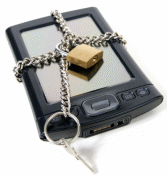Usually, the most common security feature found in mobile phones is the phone tracing feature in case the instrument has been misplaced, lost or stolen. Another simple security feature is the phone lock code or the pin lock code. Apart from these, the majority of the phone users are not concerned with any security features.
The probable explanation for this behaviour is that till now not many companies have ventured into the field of mobile security and as such, people are not aware of any such products. Even if there are any companies into this field, they have not been able to garner the customer base due to lack of general awareness.
Otherwise, there are millions of people who would like to opt for mobile security software. We plan to generate this awareness by floating various advertisements in different media such as newspapers, local television channels, and hoardings at prominent public places like railway stations, bus stations etc.
We also plan to conduct some presentations in different localities. Due to the incessant technological advancements, so many different features are being added to mobile phones that they have been named ‘smart phones’.
Starting with a simple call making and receiving feature, today mobile phones have features like computing, data storing, internet browsing, e-mailing, video shooting, net-banking, etc. Mobile phone has become a sort of hand held computer. When such important functions are carried out by mobile phones, it is but obvious that there should be some kind of security so that the stored data is not misused.
The need of the hour is some security application that can perform mainly the following four functions:
- The user should be able to remotely delete all the stored data in case of the mobile being stolen or lost.
- The application should be able to backup the data automatically on a daily basis. And whenever required, the user should be able to restore the data.
- The most important feature that should be in a mobile security application is that whenever a user opens any particular file, his/her identity should be confirmed.
- The security application should be able to scrutinize all the incoming messages through the service provider and through Bluetooth as well.
There is no particular age bracket or specific gender that can be considered being more inclined towards using mobile security application or software. It depends on the profile of an individual or the kind of job that he/she does. Normally, the security aspect is more vital for people who store data on their mobiles. This is done by professionals, students, business people, etc. But since the mentioned categories are more or less age specific, the inclination can be related to the age.
But it is difficult to differentiate the inclination with regard to the gender. Today’s women are standing shoulder to shoulder with males. Unlike earlier years, today even girls go to schools; there are women professionals as well as business women. It should be understood that different categories of people use their smart phones for different purposes, apart from making or receiving calls. Students, for example, use their smart phones mainly to exchange pictures, messages, emails, and sometimes their academic notes.
The professionals use their smart phones to store data related to their office such as sales figures, commissions, targets, list of customers, list of vendors, product details, etc. business people use their smart phones to keep track of their business and staff’s performance. It is evident that the purpose is different for these categories of people. But there are some functions that may be common to all the categories; e-mailing, net banking, and messaging.
One important thing to mention is that in order to use a smart phone or a mobile security application, it is a must to be educated. The instructions should be understood properly so that the maximum benefit can be taken. So education plays a vital role in people’s inclination towards using mobile security application. Countries that have greater rate of literacy can prove to be better markets for mobile security application.
Another factor that can play a major role in the performance of mobile security application is the technological development in a particular country. Countries that are technologically more advanced will have more number of smart phone users and hence there will be a greater market for such applications.
In order to promote our product, we plan to distribute free packages that will have limited features but by using these features, the customers will surely approve of our product.
Our product will come in a stylish package with the main features highlighted. Due to stringent environment pollution policy, we plan to use cardboard instead of plastic for packing our product. The packaging size will be 20cm X 15cm X 1cm. on the front we plan to print a picture somewhat similar to the one below:

When a customer will use our product, somewhat similar screen as below will appear:

Similar products
There are many free mobile security applications available in the market. But their features are limited and as such, the user doesn’t get the full desired security.
Moreover, most of the companies that provide such free applications are not reputed ones and as such, they can’t be trusted for providing authentic security. The issue of security is very critical and the users can’t risk by buying unauthenticated software. Nevertheless, there are a few companies that are in the business of providing mobile security applications. Some of these companies’ brands are listed below:
- Avast!: Smith informed that, “Avast!’s entry into the Android market is not a surprise. There’s anti-virus protection, a web shield that warns users of URLs known to contain malware, anti-theft features…and a ‘stealth mode’ that hides the security app from prying eyes” (Smith 2012).
- Lookout: According to the company’s website, “Lookout delivers all-in-one protection for iPad and Android tablets, as well as iPhone and Android smart phones” (Lookout). Commenting on the features of Lookout, Jordan Robertson suggested that, “Lookout customers who lose their phones can log into a website and see where the phone is and activate a loud screaming noise to keep thieves at bay” (Robertson 2012).
- BullGuard: According to the company website BullGuard “comes with antimalware protection, parental control, anti theft and back up solutions to keep your kids, your data and yourself in complete safety” (BullGuard).
- Kaspersky: The Company claims that, “You make calls, send SMSs, browse the web and communicate via social networks every day. Your smart phone is your life. Kaspersky mobile security keeps your private life truly private” (Kaspersky).
- ESET: The Company claims that’ “ESET mobile security also protects your Window mobile and Symbian smart phones. Our solution features built-in advanced heuristic technology that detects even the most sophisticated mobile malware” (ESET).
- Quick Heal: Hattersley suggested that, “The Quick Heal mobile security for Android app scans both the Android device and any installed media cards, unless you tell it not to check both” (Hattersley 2012).
- Trend Micro: According to the Company website, “Trend Micro mobile security is an integrated mobile device management and security solution within a security framework that spans physical and virtual, PC and non-PC devices” (TrendMicro).
- Some other mobile security application brands are: F-Secure mobile security, NetQin mobile security, and Webroot secure anywhere mobile.
Mobile users in Australia
According to an online report, “There are around six million more mobile subscribers than people in Australia. Growth is likely to continue in the foreseeable as smart phone penetration rates are about 125% of the population” (Budde).
Details of mobile set users who had internet connection in Australia
(Figures in thousands)
According to the Australian Bureau of Statistics, “Australia had 11 million mobile handset subscribers by the end of December 2011. This represents an increase of 13.6% from June 2011. Of these, 2.2 million (20%) were dedicated data subscriptions and 8.8 million (80%) were all other active standard mobile subscriptions” (ABS 2012).
As per Nielson, “43% of online Australians now own a smart phone. Over one quarter of social networkers (26%) participated in mobile social networking in the past year. 66% of mobile social networkers are under 35 years of age” (as cited by Heidiallen 2010).
For our functions in Australia, we are under negotiations with two mobile operators namely, Optus and Vodafone.
Mobile users in New Zealand
Asia Room reported that, “According to a survey of 2005 about 3.6 million people are mobile users in the nation and are catered by two network operators” (Asiaroom).
According to a survey conducted by ChartsBin, the total number of mobile users in New Zealand in the year 2010 was 5.02 million.
For our functions in New Zealand, we are under negotiations with two mobile operators namely, Vodafone and Telecom XT.
Mobile users in North America
Athima Chansanchai wrote that, “Smart phone shoppers may be buying more Android phones, but that could change fast: 41 percent of current mobile users have their sights set on the iPhone 5” (Chansanchai). She further wrote that, “A recent survey of mobile users in North America, conducted by the mobile ad network inMobi, shows that big numbers plan to turn out to buy the latest version of apple’s smart phone” (Chansanchai)
According to a survey done by ChartsBin, in the year 2010, the total number of mobile phone users in North America was 3,943,002,000. The figures include those of Canada (24,037.4), United States of America (278,900), and Mexico (91,362.8).
According to surveys conducted by various people and agencies, the American people have the trend of shopping through their mobiles. Most of the shopping is done in order to purchase gifts for friends and relatives. Other uses that the people of America take from their smart phones are: finding location of preferred stores, accessing the internet, etc. Considering these factors, it can be understood that the future holds good for mobile phones and smart phones.
For our functions in North America we are under negotiations with Alaska Communications.
So if the existing customers are to be targeted for the mobile security application, the developed countries should be the target market. And if the new and future customers are to be targeted, the developing countries should be the target market.
References
ABS 2012, Mobile Handset Subscribers. Web.
Asiaroom., New Zealand Communication. Web.
Budde., Australia – Mobile Communications – Subscriber Statistics. Web.
BullGuard., BullGuard Mobile Security 10. Web.
Chansanchai, A., Survey: 41 percent of Mobile Users to Buy iPhone 5. Web.
ESET., ESET Mobile Security. Web.
Hattersley, R. 2012, Quick Heal Mobile Security for Android Review. Web.
Heidiallen 2010, Mobile Usage in Australia 2010. Web.
Kaspersky., Kaspersky Mobile Security 9. Web.
Lookout., Lookout Mobile Security comes to the Big Screen. Web.
Robertson, J. 2012, Lose Your Smart phone? Check McDonald’s or the Dojo. Web.
Smith, M. 2012, Avast! Introduces Free Mobile Security App for Android 2.1+. Web.
Trend Micro, Comprehensive Protection for Both Employee-owned and Company Mobile Devices. Web.